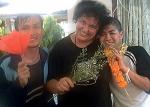Time, Walking, Women
Time, Walking, Women, Waiting, Matatus and Plastic
In Africa these things work together in a synchronous whole says Ryszard Kapuściński in “Shadow Of The Sun.” Rattle-trap matatus-minibuses that serve as public transportation-all seats and the space in between and the space full from floor to ceiling whiz by. What time does the bus leave for it’s destination? The answer is when it fills up. Time for on most of this continent only has meaning in relation to events. If you ask when does the bus leave it makes no sense. The bus will leave when it is full so one must wait…quietly with unseeing eyes…when people are waiting…for this is what they must do before something can happen…they do not react to anything around.
But people are happy to wait for the bus because for eons before this Africa walked-indeed they still walk in the rural areas which is most of African countries and they carry whatever has to be transported on their shoulders or heads. Entire cities and everything in them were carried into the interiors on the heads of the people in the 18th century when there were no roads-only paths.
On this ancient system of paths people walked silently and single file and they still do today even if they are traveling on one of today�s wide roads. And it is the women who do the transporting…they may have to walk several miles every day in one direction for wood and often in another direction for water.
Modern technology has made their lives easier because instead of heavy earthen urns for water they now have red, green and blue plastic buckets. A woman will squat down and place the bucket on her head. Then straightening up she will carefully balance herself. Stepping with an elegant, smooth even gait she walks silently and resolutely down a forest path leading to…a place we will never see. When we pass in the truck she may turn her body slightly and wave. I am immensely impressed. They learn early how to do this…we see a girl about 7 years old walking down a path with a huge heavy bucket of water held up on her head by her tiny neck. When the woman has collected the wood for a fire and the water then she can begin cooking the one meal of the day…
The women carry water, chop wood and work the fields; the armies of men for the most part are unemployed. But they could help the women carry water and wood and work in the fields, we say to each other! But this is Africa and it won’t happen!
The younger men trek from the rural areas to the city in search of work but they find neither jobs nor a roof. They should do something…But what? What should they do with their unutilized energy? With their hidden potential? What is their place in the world? They squat idly on all the larger streets and squares of cities we have been in. In less stable countries, with the promise of shoes or a meal they are recruited by local chieftains when they need to recruit armies, organize coups or foment a civil war.
Tags: African Continent, Culture, Malawi, Reading, Reflections, Transportation


Leave a Reply